As promised: Renaissance album Lyrics that Connect with Cowboy Carter
Lyrically speaking across Beyoncé's Acts I and II...and what may be in store for Act III
This is definitely a nerdy post, but it’s a blog called My Number One Feeling, so it’s par for the course. After writing about the transfer portal between Beyoncé’s Acts I and II last week, I mentioned doing a follow-up. I bring you lyrics from Renaissance that somehow harken back to Cowboy Carter. The storytelling happens on multiple levels in this three-act project: each album itself, across the albums, and a larger grand narrative that will likely be purposely revealed once we are blessed with the visuals. Respect the process.
These are not exhaustive of all 16 tracks on Renny, nor am I giving you every single instance. I tried to limit it to ones that scratched something in my brain. These are my interpretations. Please let me know what yours are if they are different.
I'm that girl
In 'Zooming Out' I discussed how this song is Beyoncé landing on Venus after ascending in death at the end of 'Amen'. She changes from a masculine form to a feminine one at the opening of Renny. The alien-like sounds and the cadence at the beginning, reminiscent of the audio of Buzz Aldren and Lance Armstrong landing on the moon, all convey that sonic mood. But. The lyrical crossover that interests me comes at the end:
"cleanse me of my sins, my un-American life"—I’m That Girl
"We'll be the ones to purify our fathers' sins"—Amen
We know she's her father's daughter, she's that girl, she's mother, she's Venus. But is she also father? We're not purifying our father's sins here; she's requesting to be cleansed of 'my' sins. Cowboy Carter has spiritual and biblical themes attached, making the spiritual anchors on Renny much more potent.
This 'cleansing' request makes so much sense with the theme of the next track, which flips this idea. Love is a core theme of Renny because it's the thing that cleanses sin and the thing Cowboy Carter understands Black people have been denied.
Cozy
One of my favourite translations of the Sanskrit term' namasté' is 'the god in me sees the god in you.' Because Hinduism isn't a proselytising religion, there's no blasphemy there. Cozy is a manifestation of that idea. Beyoncé, as the Motherboard, pours praises into Black people, Black queer people. It is not patronising because it's acknowledged as something we already know ("this a reminder". But being beaten down by the world can make you forget.
Also, 'you're a god, you're a hero' is very much giving Cowboy Carter. I called him someone sent by the ancestors to America, there to assess the levels of floppery toward Black people. It's so trash that we ascend with Cowboy Carter on 'Amen'. In this new extraterrestrial dimension, Beyoncé reminds us of who we are after having 'survived all [we've] been through' while stating her self-love and warding off envious green eyes aimed at her people.
Alien Superstar
In hindsight, this isn't just a cunty thing to say at the opening of a brilliant album by a living legend of an artist. Digging deeper, a 'holy trinity' reference recalls 'Daughter' on CC ("cleans me holy trinity"). In Christianity, the Father, the Son and the holy ghost are one: the only one.
Also, the 'alien' part of the superstar references uniqueness (nerve, talent and charisma) and being 'un-American'. This refers to the themes of rejection on Cowboy Carter and how the country has never seen Black people as full citizens. 'Alien' is another term for 'foreigner'; Beyoncé turns it into a stratospheric compliment toward our refusal to conform. The term 'alien' is widely used in the American immigration system. I think my old green card used to say 'Alien Resident Card' before I became a citizen 20 years ago.
"mile high when I rodeo then I come down and take off again…reaching out to the solar system [after doing a troubleshoot of the entire system in the beginning!] | We flyin' over bullshit…supernatural love up in the air".
I mashed up those lyrics, but they make me think of this merch image for Cowboy Carter on beyonce.com.
Break My Soul
Again, the spirituality is so much more potent on Renny after studying CC. With her 'un-American' life and the freedom from limitations associated with that, she's building a new foundation with this new salvation. I wrote that Cowboy Carter's Jesus-like ending is the salvation through which we become reborn on planet Renny/Venus. Beyoncé didn't wait for Country Music to invite her to the table after rejecting her in 2016. She went out and established her own foundation, creating a table big enough to seat those on the margins. It's part of her musical and cultural legacy. And she is firmly in her legacy era, on a new vibration.
Church Girl
As a former church girl of the Pentecostal variety, I love this song and don't understand those who slander it. I love that it's trap-gospel in the way that I love that 'Tyrant' is trap-country. I love how 'Break My Soul', with its heavy emphasis on the gospel choir vocals, is the perfect lead into this song (even though it does not sonically transition like every other song before). But there are 1, 2, THREE songs from Cowboy Carter that are in a relationship with 'Church Girl'.
Just for Fun
'Church Girl' (CG) is the complement to 'Just for Fun'; the gendered yin to its yang:
• 'Just for Fun' (JFF) is a prayer to god about knowing you have been placed in a situation for a reason, but you "don't know the purpose". The opening lines of 'CG', which ask to be 'centred' in god's will, achieve a similar purpose.
• In JFF, Cowboy Carter is "the man, I know it" (a la the Jesus figure). In CG, as a woman, being up in the party is a type of spiritual freedom for her.
• "I ain't tryna hurt nobody, tryna bring the life up in your body" is CG doing god's work outside of the church. In JFF, CC says he's born in the darkness ('16 Carriages'-coded) and asks who brings the light. Well, it's Church Girl. She brings the light and the life up in your body.
• Tonally, JFF, despite its title, is a very downbeat song. There's something internal that is not fun for him, even though he came 'down south' just for the fun. On CG, she twerks "that ass like [she] came up out the south". She's having the fun CC could not.
Alligator Tears
"feel like I've moved mountains, got friends that cried fountains"
That line made me think about this one from Alligator Tears:
"you say move a mountain and I'll throw on my boots; you say stop the river from running, I'll build a damn or two"
CC is being worked over, exhausted by the high tide of alligator tears, and is "running on fear' (oh dear). CG is freeing herself and all her friends from the centuries-old self-victimisation narrative and changing of goalposts Black people navigate because of whiteness.
CG recovers and repurposes Christianity in a way that serves her (and everyone else) and is void of judgment and shame. All of that takes us back to the purpose of escaping to planet Renny/Venus—the abandoning of all conventions that tie us down and make us deny our true selves.
Daughter
Okay, one more small thing (lol when I tell you I didn't even include CG in my first draft of this!). 'Daughter', with all that praying to god to stop her revenge fantasies and praying for the holy trinity to cleanse her of her sins, is CG-coded. Praying to be cleansed of the marijuana smoke smell feels like 'you got church in the morning' after abandoning oneself to fantasy the night before at the party. Sure, 'Daughter' makes complete sense following 'Jolene' on CC, especially the 'Caro Mio Ben' interlude. But, as I said, each album has its own storytelling, but there's also storytelling across the three-Act project. Lastly, "I don't fellowship with these fake ones" resonates with CG's being "happy on her own, with her friends, without a man," especially since 'Daughter's man betrayed her.
Plastic off the Sofa and Virgo's Groove
'Plastic off the Sofa' (POTS) and 'Virgo's Groove' (VG) are inseparable to me in the same way that 'Riiverdance' (R) and 'II Hands II Heaven' (HH) are, especially in the storytelling. Songs in each pairing flow seamlessly into one another, and they are both about different stages of an epic love that traverses space and time.
Because the CC album is thematically first in the trilogy project, this risky love ('no hands'—guardrails) starts on R before she knows it will be special. But in the end, she's hooked. Sonically, you hear the heartbeat running through the whole thing. It's a rush that's different from the double-time beating in HH when she decides to really give this thing a chance. It's not until time passes in the song's latter half that there's a slowdown from the frenetic pace of this relationship. These 'ten thousand steps' they've run through the river have proven to her that this guy is not a rhinestone, but a diamond ('my diamond, my rock'--***Flawless). Meaning: he a real one. Only experiencing and making it through darkness in the relationship reveals this to her ('rhinestones and diamonds both shine in the light").
Also, I nerded out a bit on this line: "we partied in Venus (Renny), and we woke up in Mars (associations with red, war, conflict). Beyond the gender themes I mentioned in 'Zoom Out', the line may allude to the Rock/Rap act to follow.
Anyway…POTS is a vulnerable and emotional continuation of the story that begins on CC. Perhaps some years after the end of HH. On planet Renny, they can relish in their love where they are themselves, away from a world that's "too hard on [them]" world. The 'plastic' being removed means the love is comfortable, lived in, without barriers—unlike the plastic-covered sofas some of us grew up in that needed to remain pristine for visitors, not the household's residents.
VG is the erotic part that takes place on the couch from which the plastic from POTS has been removed—the emotional, sexual and spiritual barriers are removed. In VG she tells him he brings her back to life. This is both in the sexual because, as Karen Parsons tells us in the movie 'Class Act' (1992): "To die back then meant to have a sexual orgasm" (le petit mort). The "someone brought me back to life but never to my senses" from Riiverdance) is the same one she's asking to break her back (errr… her groove) on VF. She wasn't ready to claim back on CC.
Move
If I may be so woke, this song is about Black people (particularly femmes) unapologetically taking up space. There's no asking, only demanding and warning those seeking to colonise the space themselves.
I once read a scholar's (still) unpublished article that explains how whiteness is distilled to the unordained exercise of spacial occupation. They think they have a god-given right to space—physical, emotional and mental ('how does it feel to be adored?' [by force]—Aliigator Tears). They want our whole lives to be about yielding space to them in all those forms, even when we create our own lanes. Toni Morrison famously wrote about blackness from the inside out, caring not to explain cultural conventions to white audiences reading her books. When she was interviewed, Morrison would incessantly be asked when she would write about white characters, as doing so would mean she had truly arrived. Please watch this infamous schooling she gives PBS's Charlie Rose, and I'll move on.
In many ways, Beyoncé has been telling white people to move out the way since 2016—the year she became 'Black' to them (and to some of y'all—smh). On 'Move', Beyoncé says it out loud: '—ck out my face…Move out the way, I'm with my girls and we all need space'. Space to vibe, to kiss, smoke, and live sweet moments. On planet Renny, they have no right to any of the space they demand in the America CC speaks of.
Lastly, 'space' can also be thought of in extraterrestrial terms since that's the foundation of Renny. We're away from earth. I can't help thinking this anti-colonial song has another layer because Musk, Bezos and 'em are in a race to colonise the Moon and Mars with American capitalism so they can bring back slavery since it isn't illegal there.
Heated
That line is very reminiscent of 'Alligator Tears'. 'Heated' is also the turn up after 'Move', where she reminds those who need reminding of who she is.
Thique
When Beyonce says "They gotta make a fold out to fit a magazine right", it’s a callback to 'Levii Jeans' where she calls herself 'a fucking centrefold'. Among other things, 'Thique' praises black feminine body ideals, which are typically denounced and then imitated by white bodies to be capitalised upon, especially in the US. But Black Venus, in a Louisiana lilt, reminds us 'that's that thique, that's that real shit', and it is to be celebrated ('champagne and cherry, baby'). It's what is both hated and desired ('they hate me 'cause they want me'—Cozy).
Also, the fact that thickness is associated with money and food in this song alludes to both my previous statement, and it's also giving bell hooks' essay 'Eating the Other'.
All Up in Your Mind
A main theme of Renaissance is Beyoncé as mother/motherboard. She wants to be all up in our minds, replacing the Echoville of the controlling media, which controls those minds.
This is also a commentary on why she stopped doing interviews and doesn't front on social media like some artists who use it as a lifeline with their fans. Maybe their art (or product) is so empty that it doesn't stay all up in our minds.
AUIYM's lyrics are reminiscent of songs like 'Riiverdance' and 'Tyrant'. It sounds like Tyrant's more vulnerable sister.
In AUIYM because she's trying to get this guy's attention ('Why don't you take the time to really notice me'; 'I try to get all up in your mind'). It's all hypothetical ('you need a real wild girl, all your demons, it's gon take a little work). She'sarrested by his time-stopping smile in the same way she was in Riiverdance when she wrote about the day they met and extremely attracted to him: "This kitty always wants you; I'm the only one for you".
Then, there are all the references to riding and being in the saddle in both songs:
"the rider always wants you; I'll be groupie for you" —AUIYM
"Ride it like hydraulics, I am such a tyrant"—Tyrant
They each approach the love interest with a different energy. AUIYM is femme-coded, and 'Tyrant' is slightly more aggressive, even emotionally distant.
America Has a Problem
You know what's funny? I remember everyone thinking this song would be political when the tracklist for Renny dropped. The song is political with the added CC context. The problem with America is its lack of love for Black people. Beyoncé's here to serve it up like a drug for us to get hi-i-i-igh on. And you can't get no higher (NO!) than love. She's our love dealer on planet Renny, and she’s a problem the petty ones can’t fuck with.
Pure\Honey
Besides being a super cunty, femme anthem that pays homage to queer ballroom culture, my favourite line is the one above. On this one and 'Break my Soul', there's reference to the struggle of everyday people. On ‘Break My Soul’ is quitting one's job because of exploitation; on P/H that struggle is brought back. On CC, both 'Texas Hold' Em' and 'YaYa' explicitly refer to material struggle in America. In all four songs, dance becomes a temporary way of escaping these realities. Renny completely leans into this form of escape that CC teases.
Acts I and II have given us a take on 'Honey'. There's gotta be a 'Honey' on Act III. Maybe instead, 'Pour Some Sugar on Me', there's honey being poured on her body? We shall see. We know she's a literal beekeeper, so will she come out with Cé Miel?
(side note: I only recently noticed in 'Pure/Honey, ' Beyoncé says 'gworls to the floor', not 'girls to the floor').
Summer Renaissance
Acts I and II have different personas. Beyoncé nods to this roleplay on 'Summer Renaissance' just as she transitions to Act III.
The ‘roleplay’ line is also a kinky one when you put it next to lines like
"Black silicone & rubbers (I can feel you through those jeans)"
To my queer ears, this sounds like the person she's feelin' on is wearing a strap, not an anatomical penis. This makes me love the line even more and re-emphasises the queer celebrations of Renny before this persona departs.
This album's closing interpolates the queen of disco but also contains house, gospel and even hip-hop elements. In terms of how it will serve as a transition portal is very interesting. Perhaps the clue for the transition to Act III isn't in her literal words but in the cadence of those words, her Bey-girl stance. A 'Walk this way' stance. She kinda rappin on this part:
It would make sense with the sound of AHAP being very late 80s/early 90s, including the flow of her rhyming on that song. The flows on 'Summer Renaissance', AHAP, and 'Spagettii' from CC …
It's not the kind of rapping that is current—it's not mumble rap, drill, or even whatever the fuck Drake does. We shall see what she does with all this. I'm not an expert on rap flows, so feel free to jump in with expertise.
Okay, I hope you enjoyed this. If you did, please like, subscribe, and comment with your thoughts or additions. I promise my next post will be about a different topic.


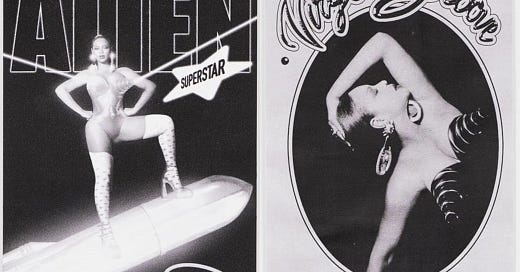



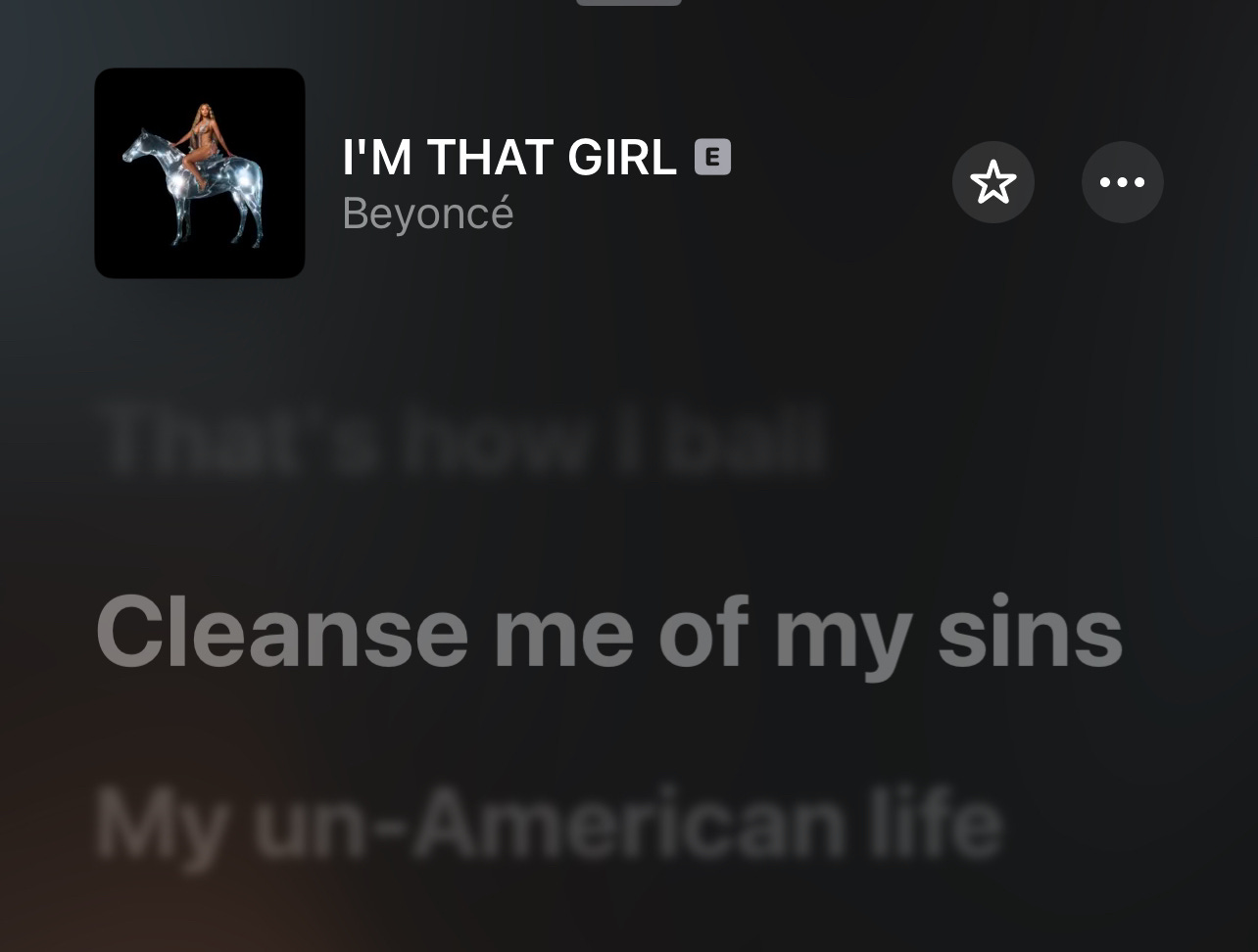
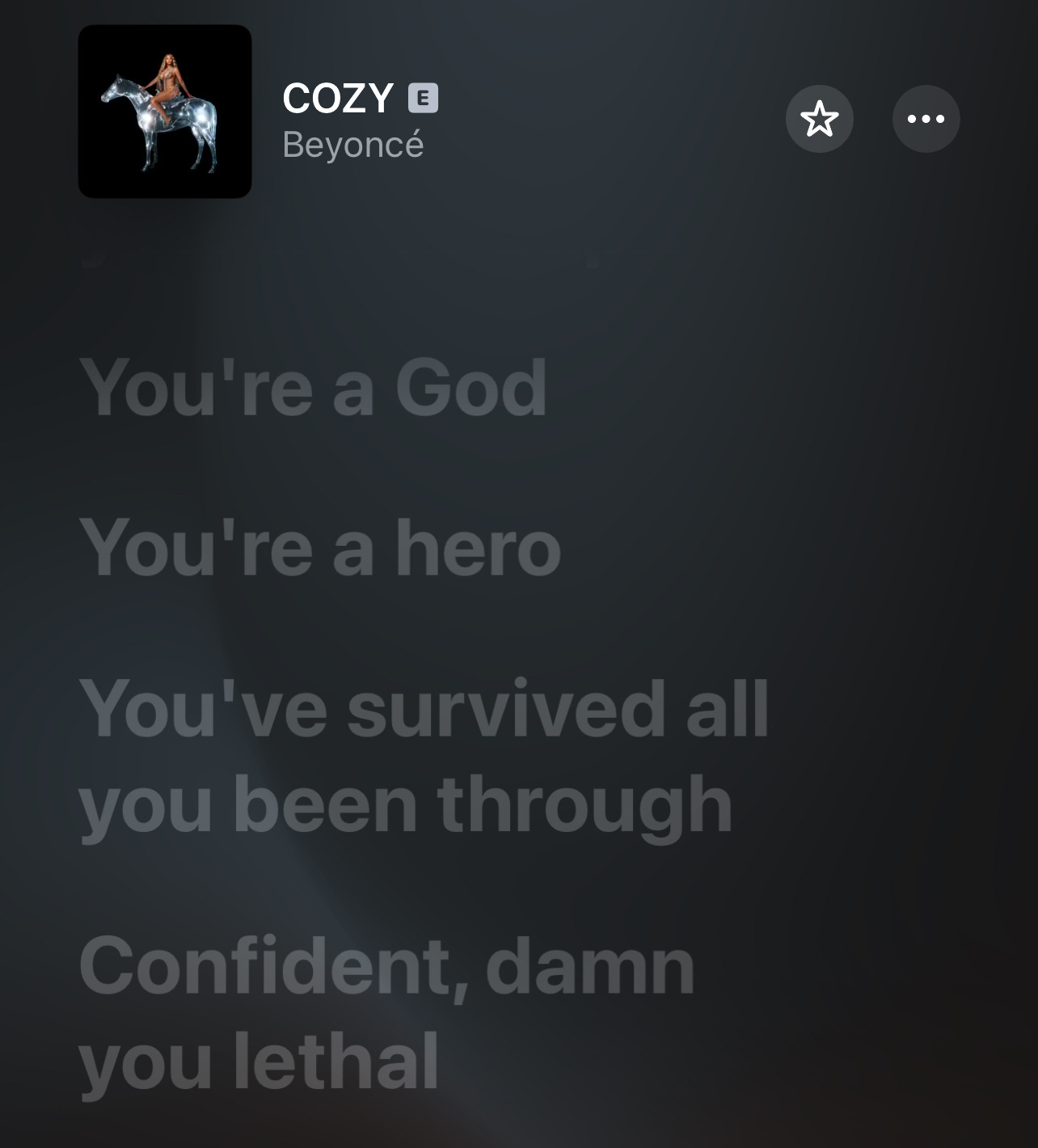
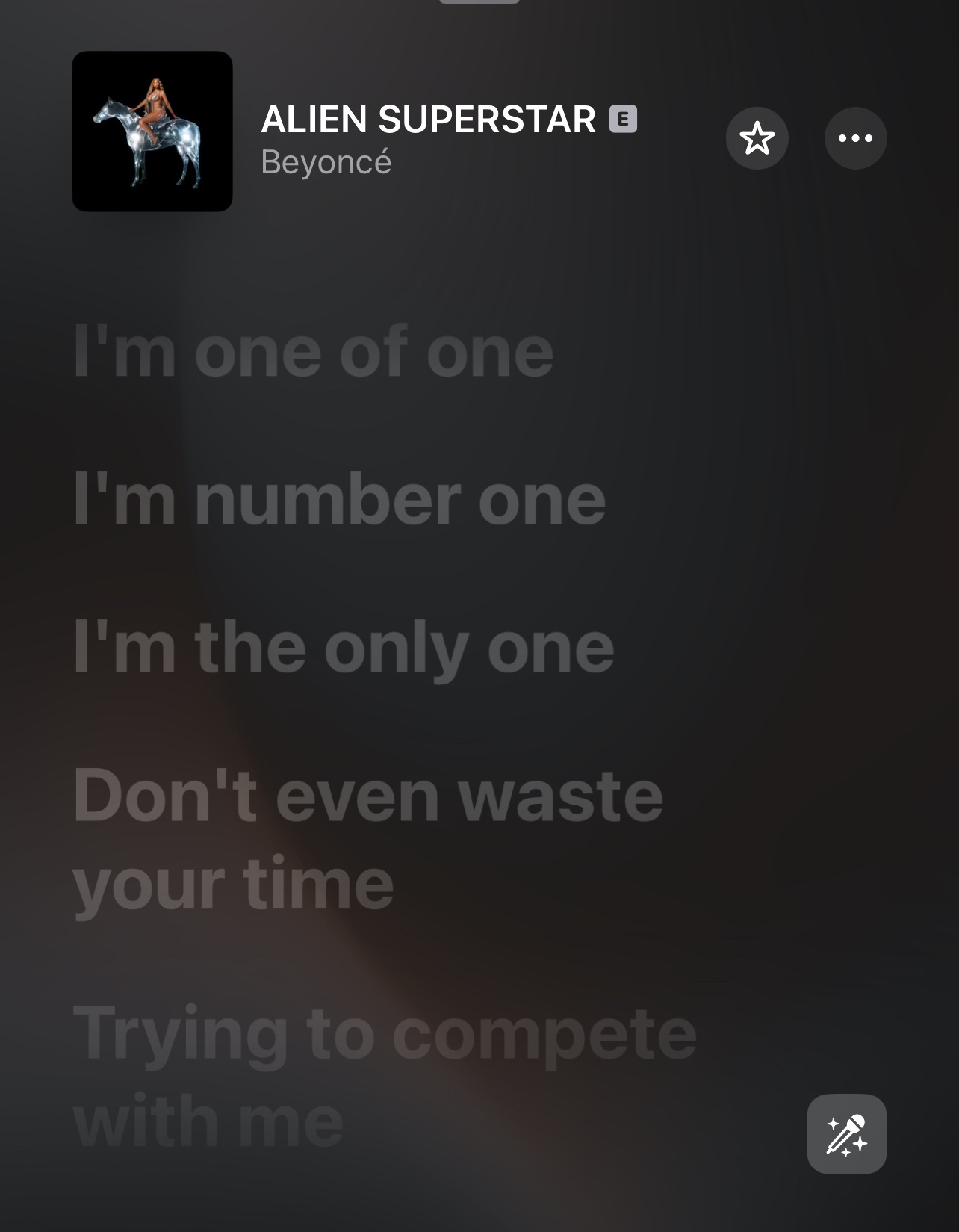
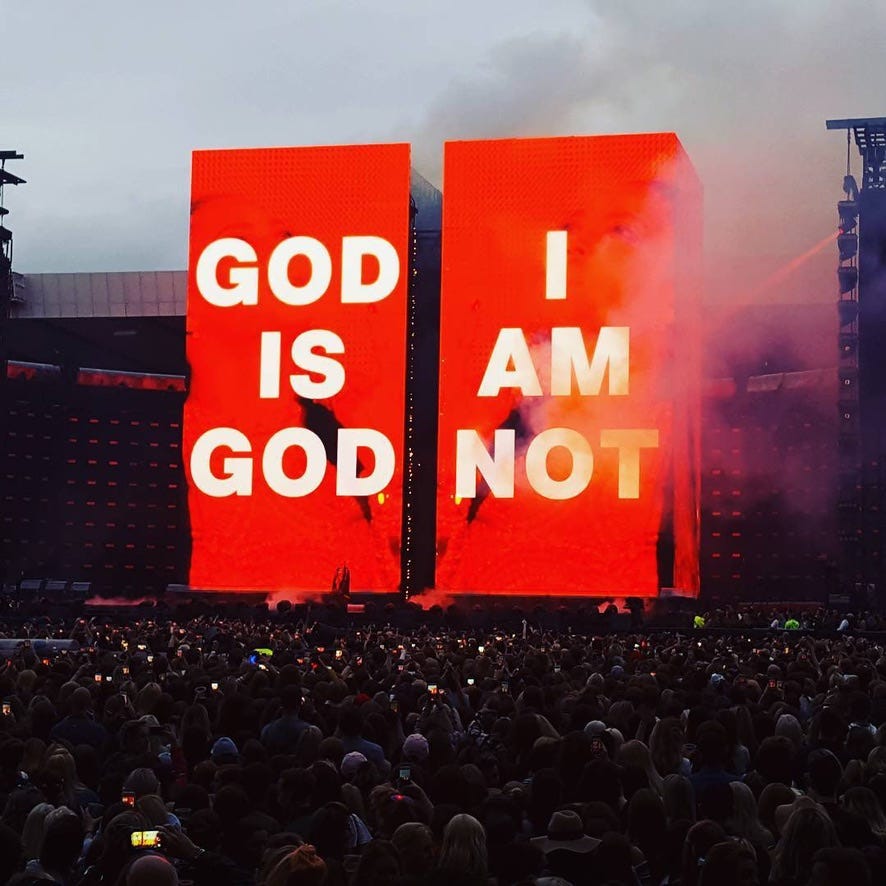



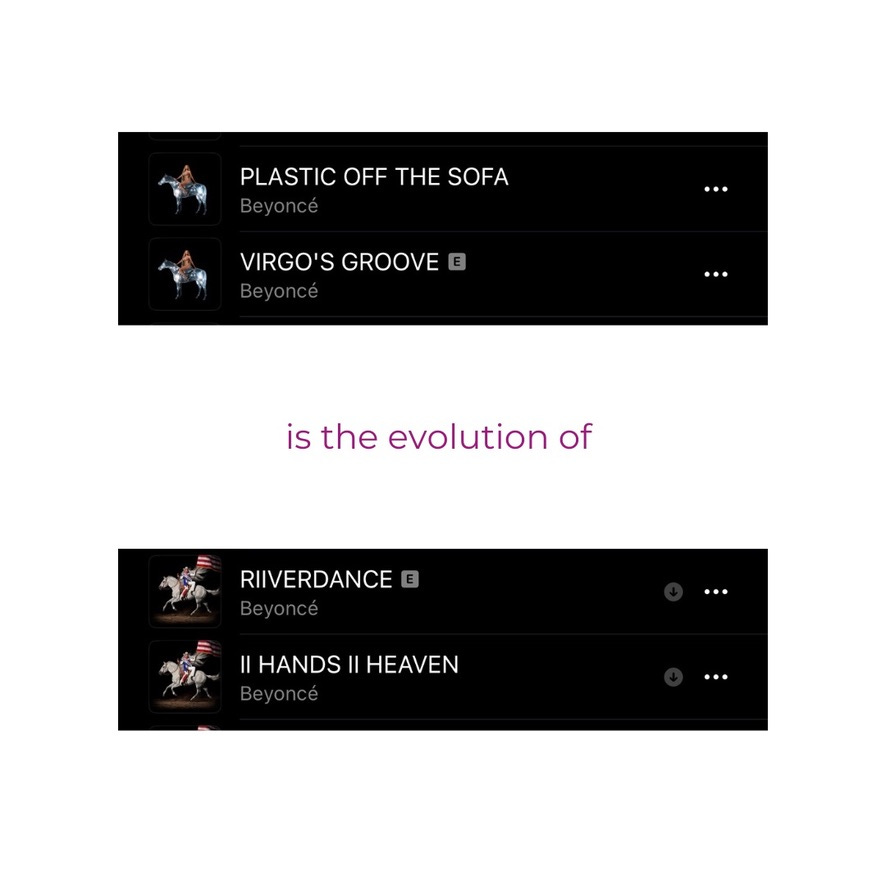


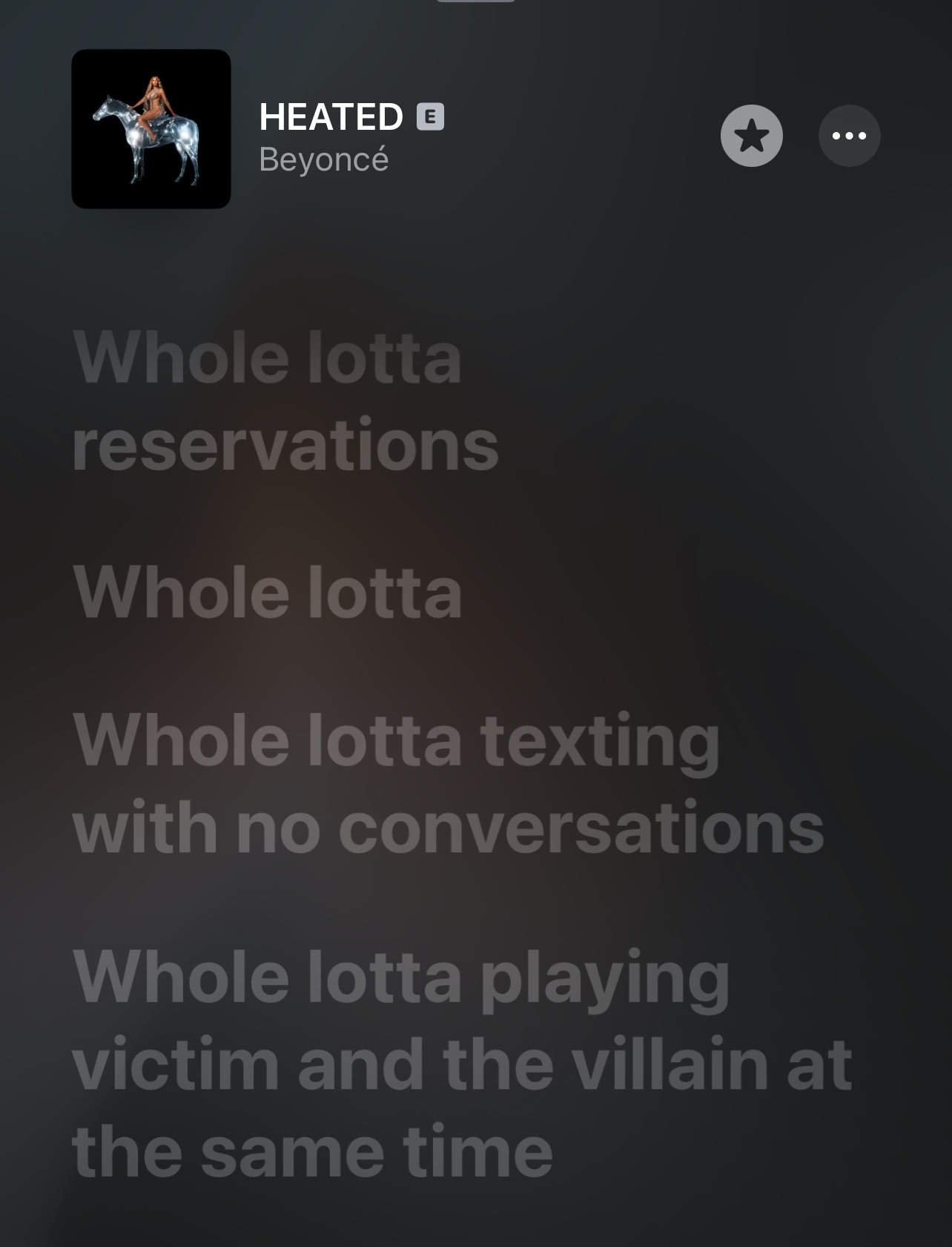






"Love is a core theme of Renny because it's the thing that cleanses sin and the thing Cowboy Carter understands Black people have been denied."
Absolutely! This sentence activated something for me. I'm really loving your analysis. Thanks for sharing.